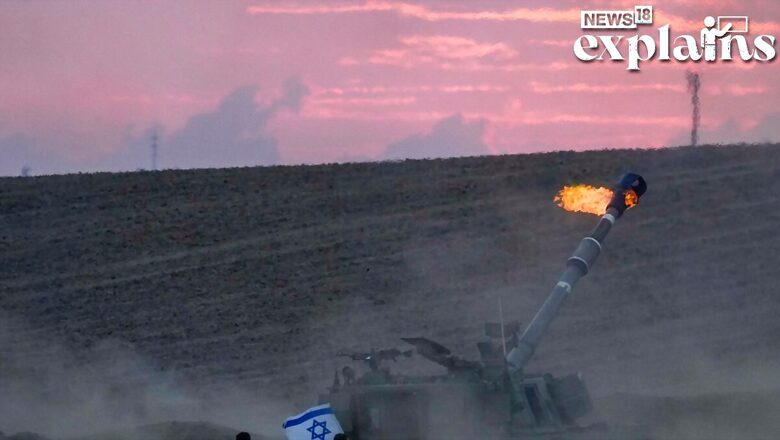
views
The Israeli military is preparing for a ground offensive in Gaza, after giving Palestinians a little more time to flee northern areas it has vowed a ground incursion to retaliate against Hamas’ deadliest attack in its history.
Israeli Prime Minister Benjamin Netanyahu visited troops on the border front line, raising expectations of an imminent invasion. “Are you ready for what is coming? More is coming,” he was heard telling several soldiers on a video released by his office.
The fighting, which has gone on for over a week, resulted in the death of more than 1,300 people in Israel and killed over 2,200 in Gaza.
Israel has warned around 1.1 million Gazans living in the north of the Palestinian territory to flee as an army official warned of air, sea and land attack on Gaza City, the base of the leadership of the Hamas militant group.
Israel has attacked Gaza four times since Hamas took over the Palestinian territory, between the Mediterranean Sea and Israeli lands, in 2007. However, those were air strikes or brief conflicts.
But this time, after the Hamas attack which dented Israel’s military aura and intelligence in the attack last week, the Israeli offensive is expected to be more forceful and reminds of similar events in the 1970s when the country launched Operation Litani against Coastal Road massacre.
Coastal Road massacre
On March 9, 1978, 11 Fatah terrorists from southern Lebanon infiltrated Israel from Lebanon by sea and took control of an Israeli bus travelling along a coastal road near Tel Aviv. In one of the deadliest terrorist attacks in Israeli history, the terrorists killed 35 Israelis including 12 children, and wounded 71.
The attack was carried out on the eve of then-Israeli prime minister Menachem Begin’s planned visit to the US to advance the peace process with Egypt after President Anwar Sadat’s historic visit to the Knesset in Jerusalem.
A Fatah leader in Lebanon later confirmed that the attack was an attempt to derail the Israeli-Egyptian peace process among other things. However, the attempt to stop the process failed as Begin delayed his trip to the US and a treaty was signed between the warring countries a year later.
The deadly attack led to Operation Litani, a large-scale Israel Defense Forces operation aimed at pushing Palestine Liberation Organization (PLO) operatives out of southern Lebanon.
Operation Litani
Three days after the Coastal Road Massacre, the Israeli military crossed the border into Lebanon and tried occupying a territory extending for about six miles and push the Palestinian militants north of the Litani River. According to the Israelis, around 4,000 terrorists were based in the area.
Israel then decided to invade Lebanon once again in 1982 under the Likud government of Prime Minister Menachem Begin. Israel wanted to eject the Palestinian Liberation Organisation (PLO) from Lebanon, remove Syrian influence from the area and establish a pro-Israel government in Lebanon, according to The Hindu.
Aftermath
Israel had fought several wars and carried military operations against Palestinian territories and neighbouring countries in the past seven decades. Though the country has managed short-term gains and some setbacks, its military operations against non-state actors tells a different story.
Though the Israeli government established a pro-Israel government of Bashir Gemayel in Beirut to bring a lasting peace, after Bashir’s assassination, Israel’s plans went uneven.
PLO continued to occupy southern Lebanon, Iran witnessed the Islamic Republic in 1979 and helped create Hezbollah in 1982. The Lebanon-based militia group mobilised marginalised Shia community and resisted Israel’s occupation that led to Israeli withdrawal from Lebanon in 2000.
Therefore, when Israel sent troops to Lebanon in 1982 to finish off the Palestinian resistance, it ended up creating a more powerful militia in southern Lebanon.
What to Expect?
Israel’s next move could be a ground offensive into Gaza, the Palestinian territory it left in 2005 after 38 years of occupation and has kept under blockade since Hamas seized power there in 2007.
The siege is expected to be devastating as it would keep Gaza out food, fuel, water and electricity.
Israeli leaders are also left to decide whether to constrain their retaliation to safeguard the hostages captured by Hamas. Hamas spokesperson Abu Ubaida issued a threat on Monday that one Israeli captive would be killed for every Israeli bombing of a civilian house without warning.













Comments
0 comment